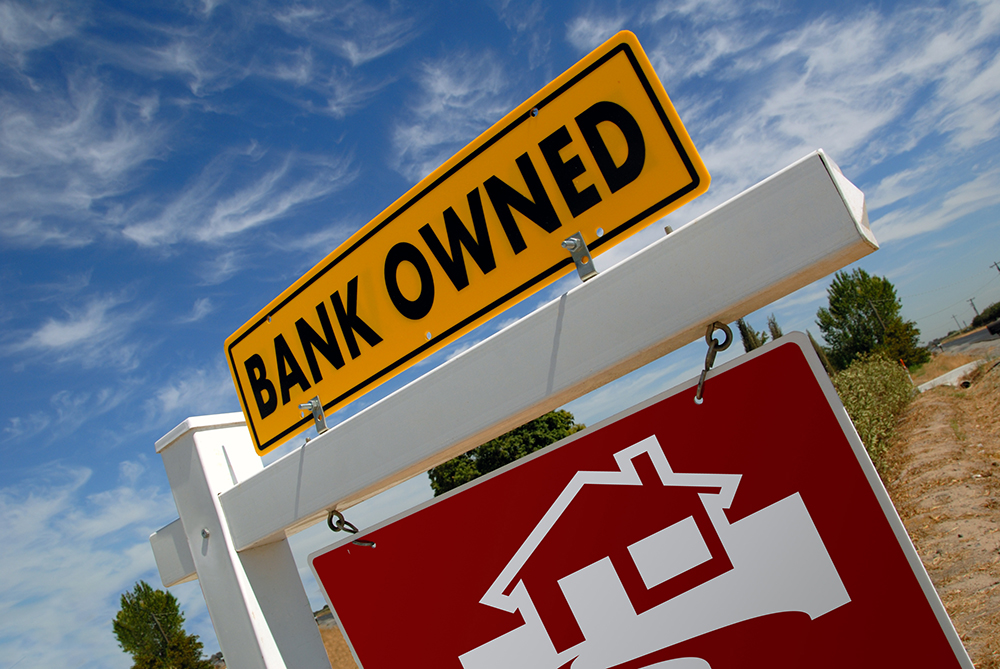
Opportunities abound in the real estate market, regardless of economic fluctuations that reflect the complex forces at work in this sector. While demand and supply affect housing trends as a whole, there may be other more specific factors at play for individual property owners that could trigger the foreclosure process. Distressed properties present unique challenges as an investment asset, depending on whether they are short sales, foreclosure auctions or bank-owned.
Find Foreclosures on Auction.com
The Foreclosure Process
The foreclosure process is a complex and often lengthy one. When property owners default on their mortgage payments, lenders take the necessary steps to protect their financial interests in the property. The initial steps typically include notifying the borrower of the default and requesting that mortgage payments and penalties be paid in full immediately.
In most states, lenders do not file the Notice of Default until borrowers are at least 90 days behind on their monthly payments. This early stage is called the pre-foreclosure phase where borrowers may have the option of renegotiating payment terms and exploring ways to bring their account back into good standing. Depending on the lender, borrowers in default may be able to take advantage of private or federal programs that offer help to homeowners. Selling the house as a pre-foreclosure or short sale at a lender-approved price may also be an option.
Once the lender files a Notice of Trustee Sale or Notice of Sale, the property is officially in foreclosure. This notification advises the borrower that the lender will take over the property to recover the funds owed by the borrower. The notice may specify an auction date, which may occur as little as 21 days after the notice. Foreclosure laws vary by state, and the auction date may be scheduled more than three weeks away. Foreclosures may be judicial, which means the lender goes through the court system to foreclose on the property leading to potentially long drawn-out timelines before the property is actually placed for sale. Or they may be non-judicial, where the foreclosure does not involve the courts and the property is usually processed much faster.
If a property fails to sell at auction, ownership reverts to the lender, and the property is now referred to as a bank-owned asset or REO (real estate owned). There are many benefits of purchasing REO properties, but there are pitfalls as well if you do not put in the necessary work to research the property.
Dealing with Bank Assets
If a property fails to sell at auction, it reverts to the lender as an asset on their books, and may be referred to as real estate owned or REO. These assets are usually managed by the loss mitigation department at the financial institution. Generally, however, these institutions are not in the business of owning property. They will take the necessary steps to secure the property to prevent further damage and loss, but they rarely undertake more than basic clean-up and repairs to enhance the house’s marketability.
Aside from physical preparation, financial institutions may take the essential steps to clear the title and establish ownership and facilitate the selling process.
The lending institution will take steps to determine who else may stake claim to the title including:
- Heirs, in cases where foreclosure was due to the death of an owner or co-owner
- Other lenders such as junior lienholders
- Liens that may be due to unpaid services performed on the property
The presence of liens creates a “cloud” on the title and will hinder a real estate sale from proceeding. If the current owner owes payments on a second mortgage or owes contractors for labor and supplies for working on the property, the new owner may be responsible for these liens attached to the asset. The property may still be sold while liens are active, but the title would be encumbered and may cause problems for the new owner. It is important for anyone considering REO properties to perform due diligence to ensure that a foreclosed home has clear title, or at least be aware of any potential encumbrances on title.
Benefits of Buying Bank Owned Properties
Experts suggest that post-foreclosure properties that have reverted to bank assets offer some of the best upside potential for buyers who put in the work required to investigate the property and make the necessary repairs and improvements after closing.
- The houses are sometimes unoccupied at this stage because the bank may have taken the necessary steps to evict occupants to prepare the property for sale.
- Basic cleanup has been undertaken.
- Aside from inspections, some contingencies could also apply although the house is sold in as-is condition.
Due Diligence
REOs are a unique set of properties with a potentially significant investment opportunity for the right investors. Due diligence is one of the critical steps that every investor must take when considering these properties.
- Start a preliminary review of the title. The bank may offer a title report based on their investigation, but you should also be prepared to conduct your own title search or consult reliable experts.
- When available, property inspections should be conducted by professionals who are experienced in this property type. While these assets are sold as-is, your home inspection report will give you a better idea of repair and renovation costs.
- Conduct a neighborhood inspection to determine if the market conditions are favorable. Even when the property is in an area with a high foreclosure rate, there may still be reasons to invest in the area such as changing employment demographics, improving school districts and gentrification.
- Review price trends, demand for housing and existing inventory levels and identify the factors influencing these trends.
- If you have a particular purpose in mind for the subject property, make sure that local zoning regulations allow for it. Keep in mind that neighborhoods may be explicit about their rules for short-term rentals.
How to Buy Bank-Owned Houses at Auction
Auction.com is the nation’s largest online marketplace for foreclosed homes across various cities and neighborhoods in the country. Auction.com can ease the complicated process of investing in high-potential distressed properties. The site has thousands of these properties under the Bank Owned category.
Step-by-Step Process:
- Go to the Auction.com homepage, click on the BUY drop down menu from the header and select BANK OWNED which generates a list of REO properties near your location.
- You can enter your preferred location in the search bar, and the site will present REOs for that specific city or zip code and nearby areas.
- Click on a property you like, which takes you to its Property Details Page where you can start your due diligence by going through the information available like opening bid, auction date, local comps, rental estimations, terms of sale, and much more.
- To eventually purchase a property, you need to register, create a Purchase Profile and if the property requires a Bid Deposit, you need to fund it. This one-time Bid Deposit allows you to bid on all properties that require a deposit.
- You can use the Save function to receive updates on auctions and customized recommendations.
- Before the auction, make sure you have all your documents ready, including proof of funds, and an Earnest Money Deposit (EMD).
- On auction day, you can bid online on the website or mobile app where you’ll see real time updates on the current bid and bid increments.
- If yours is the winning bid, make sure to complete all closing requirements within the specified time.
- You can learn more about the post-auction process from our Winning Bidder Resource Center or by reaching out to our Buyer Success Team.
Create A Free Auction.com Account

